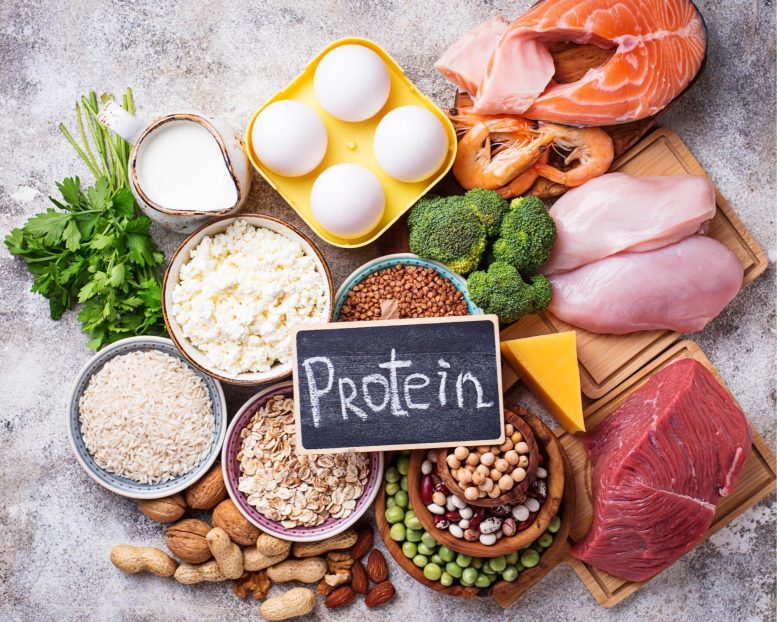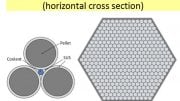
A study on mice has shown that progressive resistance strength training can mitigate the negative metabolic effects of a high-protein diet. The research unveiled that while sedentary mice on a high-protein diet accumulated more fat, those subjected to resistance training showed muscle growth and less fat accumulation. However, their blood sugar control was still adversely affected by the high protein intake. The research underscores the significance of resistance training for those on high-protein diets, especially for sedentary individuals.
Researchers shed light on the paradox: while high-protein diets enhance athletic performance, they can contribute to health issues and shortened lifespan in non-athletes.
Strength training with resistance may counteract the adverse impacts of a high-protein diet, according to new research in mice.
The study, recently published in the journal eLife, presents what the editors describe as a valuable finding on the relationship between a high-protein diet and resistance exercise on fat accumulation and glucose homeostasis, supported by solid evidence. They say the findings will be relevant to dietitians and others trying to understand links between dietary protein, diabetes, and exercise.
Dietary Protein: Benefits and Risks
Dietary protein provides essential nutrients that control a wide variety of processes in the body and can influence health and lifespan. Protein consumption is generally thought of as good, promoting muscle growth and strength, especially when combined with exercise. Yet in people with a sedentary lifestyle, too much protein can increase the risk of heart disease, diabetes, and death.
“We know that low-protein diets and diets with reduced levels of specific amino acids promote healthspan and lifespan in animals and that the short-term restriction of protein improves the health of metabolically unhealthy, adult humans,” explains lead author Michaela Trautman, Research Assistant at the Department of Medicine, School of Medicine and Public Health, University of Wisconsin, US. “But this presents a paradox – if high dietary protein is so harmful, many people with high-protein diets or protein supplements would be overweight and at an increased risk of diabetes, whereas athletes with high-protein diets are among the most metabolically healthy.”
Experiment Overview
To examine the possibility that exercise can protect against the detrimental effects of a high-protein diet, the researchers used a progressive resistance-based strength training program in mice. The animals pulled a cart carrying an increasing load of weight down a track three times per week for a three-month period or pulled an identical cart without any load for the same time period.
One group of mice was fed a low-protein diet (7% of calories from protein) and a second group was fed a high-protein diet (36% of calories from protein). The team then compared the body composition, weight, and metabolic measurements, such as blood glucose, of the different groups.
Findings and Implications
The results were as the team expected: the high-protein diet impaired metabolic health in sedentary mice pulling no weight; these mice gained excess fat mass compared to the low-protein diet mice. But in the mice pulling the increasing weight, a high-protein diet led to muscle growth, especially in the forearm, and protected the animals from gaining fat. However, the exercise did not protect the mice from the effects of high protein on blood sugar control.
Additionally, although the high-protein-fed mice gained strength more quickly than the low-protein-fed mice, there was no difference in the maximum weight each set of mice could pull by the end of the study period, even though the mice fed high-protein diets were bigger and had larger muscles.
Although the evidence supporting the claims of the study was considered to be solid, the editors highlighted a couple of limitations. For instance, the use of mice might limit the generalisability of the findings to humans, due to inherent physiological differences. The editors note that the findings would also be strengthened further by the inclusion of a direct investigation into the underlying molecular mechanisms responsible for the observed results.
“We know that many people deliberately consuming high-protein diets or consuming protein supplements to support their exercise regimen are not metabolically unhealthy, despite the body of evidence showing that high-protein levels can have detrimental metabolic effects,” says senior author Dudley Lamming, Associate Professor of Medicine (Endocrinology) at the Department of Medicine, School of Medicine and Public Health, University of Wisconsin. “Our research may explain this conundrum, by showing that resistance exercise protects from high-protein-induced fat gain in mice. This suggests that metabolically unhealthy, sedentary individuals with a high-protein diet or protein supplements might benefit from either reducing their protein intake or more resistance exercise.”
Reference: “Resistance exercise protects mice from protein-induced fat accretion” by Michaela E. Trautman, Leah N. Braucher, Christian Elliehausen, Wenyuan G. Zhu, Esther Zelenovskiy, Madelyn Green, Michelle M. Sonsalla, Chung-Yang Yeh, Troy A. Hornberger, Adam R. Konopka and Dudley W. Lamming, 16 October 2023, eLife.
DOI: 10.7554/eLife.91007.1








Health safe diet and lifestyle should be monitored for results on your overall health.
What is the paradox here? It is well known that resistance training builds muscle, provided sufficient calories and protein are present, and that excess protein in a calorie surplus will be stored as fat in sedentary people. You don’t need to study mice to confirm this, the results are evident in anybody who embarks on a resistance training program.
Check out the China Study by Dr Caldwell. Plant protein does not have the ill effects that animal protein has. All plants have the essential amino acids necessary for making protein. And animal protein is linked to cancer, diabetes and other diseases. There is no paradox. There is just a wrong culture that most people believe meat is the only protein.
I first wrote the FDA (with replies) of my early lay findings of connections between allergies, added MSG, chronic disease and “obesity” in October of 2005 (obviously, now, in-vain). Since, I’ve written thousands more professionals with equally obvious “needs-to-know,” including a few at UW Madison and the VA. There is no protein paradox, just still medically unrecognized individual human allergies to various proteins (“…detrimental metabolic effects…”), apparently so to in mice. The allergy reactions (e.g., Dr. Arthur F. Coca, by 1935; my kind) are nearly subclinical and non-IgE-mediated. I didn’t learn of even my cow’s milk allergy (not intolerance) until mysteriously, seriously ill in 1981 at age 37. As to the resistance exercise factor, long ago I found an article online stating human exercise causes the thyroid to release more T4 (pre-energy-producing-T3).